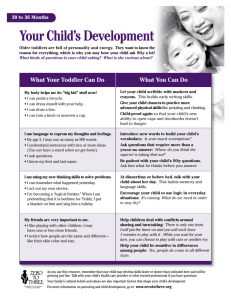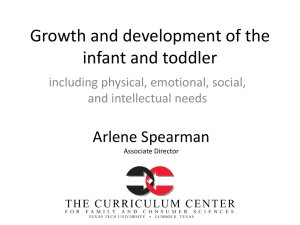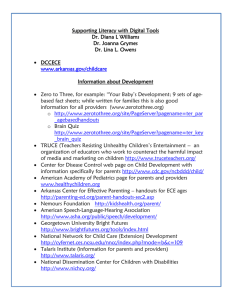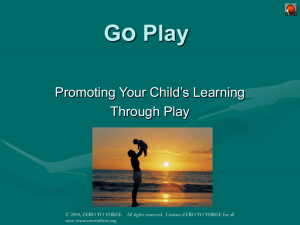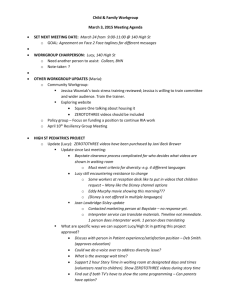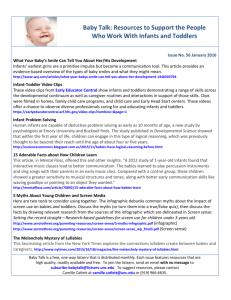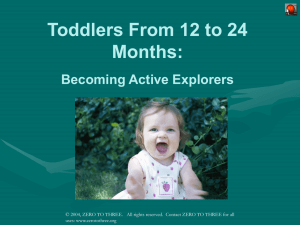Go Play – Introduction
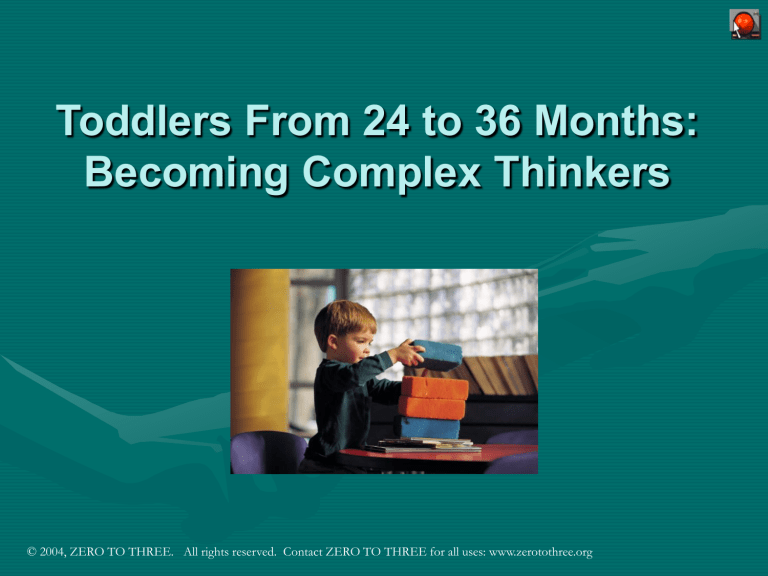
Toddlers From 24 to 36 Months:
Becoming Complex Thinkers
© 2004, ZERO TO THREE. All rights reserved. Contact ZERO TO THREE for all uses: www.zerotothree.org
Learning Through Play
Play promotes all areas of a toddler’s development:
• Physical
• Intellectual
• Communication
• Social
© 2004, ZERO TO THREE. All rights reserved. Contact ZERO TO THREE for all uses: www.zerotothree.org
Learning Through Play
•
Physical Development
– Your toddler is continuing to fine tune physical skills, including running, climbing, pedaling, and perhaps even hopping on one foot! Aim, agility, and coordination are growing skills as well.
– Through play, your child is learning to love her body and what it can do. She is probably showing you lots of “tricks”—standing on one foot, kicking or throwing a ball as far as she can, or walking backward.
© 2004, ZERO TO THREE. All rights reserved. Contact ZERO TO THREE for all uses: www.zerotothree.org
Learning Through Play
•
Physical Development
– You can support your child’s physical development by making sure she has time for active play every day. You can also provide clay, puzzles, or crayons. Exploring these toys and materials develop the small muscles in her hands and fingers (which are necessary for writing).
© 2004, ZERO TO THREE. All rights reserved. Contact ZERO TO THREE for all uses: www.zerotothree.org
Learning Through Play
•
Intellectual or Thinking
Skills
– Toddlers are developing symbolic thinking skills. This means that they are now able to let one thing (like a bowl) represent another
(like a hat). Symbolic thinking is a critical skill that children will need to learn to read and write and for math and science.
– Toddlers are beginning to understand logic and make logical connections in their play — for example, pretending to “swim” across the living room and then telling you they are wet and need to “dry off” with a blanket.
© 2004, ZERO TO THREE. All rights reserved. Contact ZERO TO THREE for all uses: www.zerotothree.org
Learning Through Play
•
Intellectual or Thinking Skills
– You will see logical connections and symbolic thinking used a lot in your child’s play—especially pretend play, which really starts to blossom at this age and continues throughout childhood.
© 2004, ZERO TO THREE. All rights reserved. Contact ZERO TO THREE for all uses: www.zerotothree.org
Learning Through Play
•
Communication Skills
– Your toddler’s language ability is probably growing by the day! Be patient. Toddlers have a lot to say and often take a long time to tell their stories. To have a caring listener makes a young child feel important and loved.
– As your child’s play becomes more complex, you hear your child using language to act out “roles”, to talk to an imaginary friend, or to develop a story that he is creating with props.
© 2004, ZERO TO THREE. All rights reserved. Contact ZERO TO THREE for all uses: www.zerotothree.org
Learning Through Play
•
Communication Skills
– You can support your child’s growing language ability by listening, following his or her lead, and taking part in his or her play.
– You can also introduce “novel” words—for example, instead of just referring to a dinosaur, you can mention a T. Rex, brontosaurus, or stegosaurus.
Instead of saying that fruit salad is just yummy, you can note that it is also tasty, delicious, or even divine.
© 2004, ZERO TO THREE. All rights reserved. Contact ZERO TO THREE for all uses: www.zerotothree.org
Learning Through Play
•
Social Skills
– Toddlers are tiny teenagers. They are sensitive, have strong feelings, and change their minds a lot. Sometimes your toddler will want to be a big kid, other times he will want to be cared for like a baby.
– You will see these issues emerge as you play with your child. For example, during pretend play, your child might want to be the mommy one day and the baby the next.
© 2004, ZERO TO THREE. All rights reserved. Contact ZERO TO THREE for all uses: www.zerotothree.org
Learning Through Play
•
Social Skills
– When your child has a tantrum, it is important to stay calm and be his rock to help him recover.
This helps him develop important coping skills that help him learn to manage strong feelings as he grows. Your nurturing response also makes him feel loved, building his selfconfidence, self-esteem, and giving him a model for positive, healthy relationships.
© 2004, ZERO TO THREE. All rights reserved. Contact ZERO TO THREE for all uses: www.zerotothree.org
Promoting Your Child’s Development
Through Play
Make play a social activity.
Older toddlers are eager for playmates.
Earlier, they may have been content to play side-by-side other children.
You are probably seeing your child play with peers by acting out stories, setting up train tracks together, or negotiating who gets to throw the ball first.
Don’t forget, your toddler and his friends still need your help as they learn to share and resolve disagreements.
© 2004, ZERO TO THREE. All rights reserved. Contact ZERO TO THREE for all uses: www.zerotothree.org
Promoting Your Child’s
Development Through Play
Let your child’s imagination be your guide.
During your child’s third year, you will see a big jump in your child’s ability to use imagination. She no longer uses blocks just to build towers. Now they become plates for a picnic, dog bones to feed stuffed animals, or cars to race along the floor.
© 2004, ZERO TO THREE. All rights reserved. Contact ZERO TO THREE for all uses: www.zerotothree.org
Promoting Your Child’s
Development Through Play
Let your child’s imagination be your guide.
Pretend play is useful to children in many ways. One of the most important ways is that pretend play offers a way to work out difficult experiences, like saying good-bye to a parent at child care or going to the doctor.
Imaginative play is also critical for building thinking skills. Children develop their ideas and act them out in their play.
© 2004, ZERO TO THREE. All rights reserved. Contact ZERO TO THREE for all uses: www.zerotothree.org
Promoting Your Child’s
Development Through Play
• Use play to help your child learn about the larger world.
As your child’s cognitive skills grow, you begin to see pretend play becoming more and more complex.
She begins to make more and more observations and logical connections between ideas. For example, now after she feeds her “baby,” she may put her to sleep.
If her stuffed giraffe is sick, she may give him medicine.
You can support your child’s logical thinking skills by asking questions about what she thinks, sees, and does. “Why do you think it gets dark out at night?” “If you’re cold, what should we do?”
© 2004, ZERO TO THREE. All rights reserved. Contact ZERO TO THREE for all uses: www.zerotothree.org
Learning Through Everyday Moments
Rachel, age 2 1/2, was playing in her sand box. She piled up the sand in a mound and called it a birthday cake. “Let’s decorate it,” she said to her dad.
Together they covered the cake with leaves and pretty rocks.
Then her father said, “Mmmm, looks good. Would you like to put some candles on top?” He reached for several small sticks and stuck them in the top of the cake.
© 2004, ZERO TO THREE. All rights reserved. Contact ZERO TO THREE for all uses: www.zerotothree.org
Promoting Your Child’s
Development Through Play
Learning Through Everyday Moments
“
Hot!” said Rachel, “Don’t touch!”
Her father nodded and promised not to go near the “flames.” Then Rachel and her father sang Happy Birthday, first for Rachel, then for her dad, then for her best friend Louisa.
© 2004, ZERO TO THREE. All rights reserved. Contact ZERO TO THREE for all uses: www.zerotothree.org
Promoting Your Child’s
Development Through Play
Learning Through Everyday Moments
Her dad asked Rachel how old she would be on her next birthday. “You are two now,” he said. “What birthday comes next?”
Rachel looked a little confused.
Her father said, “Let’s count birthdays. You were one, now you are two. What comes after two?” He paused. “One, two….”
Rachel thought for a moment. “Three!” she said. Her dad said, “That’s right.
Let’s put three candles on this cake.
How many are there now?”
© 2004, ZERO TO THREE. All rights reserved. Contact ZERO TO THREE for all uses: www.zerotothree.org
Promoting Your Child’s
Development Through Play
Learning Through Everyday Moments
Together with her dad, Rachel pointed to and counted each of the twigs on her cake: “One, two, three, four.” Her father took one twig out. “Look, now there are three candles for Rachel.
One, two, three.”
© 2004, ZERO TO THREE. All rights reserved. Contact ZERO TO THREE for all uses: www.zerotothree.org
To Think About
• What are some of the things that you think Rachel is learning through play with her dad?
• How is Rachel using her new ability to use symbols
(using one thing to represent another) in the sandbox?
• How does Rachel’s dad help her connect the pretend birthday cake with Rachel’s life experience with birthdays?
© 2004, ZERO TO THREE. All rights reserved. Contact ZERO TO THREE for all uses: www.zerotothree.org
What Was Rachel Learning?
•
Social-Emotional Skills
:
Fun and nurturing interactions with her father make Rachel feel special and loved , and lets her know she is fun to be with .
When she and dad take turns, she is learning about turn-taking and sharing . These kinds of interactions help her make friends as she grows.
© 2004, ZERO TO THREE. All rights reserved. Contact ZERO TO THREE for all uses: www.zerotothree.org
What Was Rachel Learning?
•
Language and Communication Skills:
When her dad talks to her throughout their play, he is teaching Rachel new words and encouraging her to share her ideas through language.
Singing is also a great way for young children to learn new words and to develop a love of language.
© 2004, ZERO TO THREE. All rights reserved. Contact ZERO TO THREE for all uses: www.zerotothree.org
What Was Rachel Learning
?
•
Physical Skills :
Rachel has to use a lot of upper body strength and coordination to make the cake. She builds her fine muscle (finger and hand) skills when she sticks the
“candles” in. These muscles are needed for skills as diverse as writing, drawing, throwing, and catching.
© 2004, ZERO TO THREE. All rights reserved. Contact ZERO TO THREE for all uses: www.zerotothree.org
What Was Rachel Learning?
•
Thinking Skills:
The entire pretend play scenario around making the cake provided a rich opportunity for building thinking skills.
First, Rachel had an idea to make a cake. Thinking through the steps involved in preparing her sand cake required logical thinking skills as well as a healthy dose of imagination.
© 2004, ZERO TO THREE. All rights reserved. Contact ZERO TO THREE for all uses: www.zerotothree.org
What Was Rachel Learning?
•
Thinking Skills:
Dad helped Rachel build on her ideas by extending their play to include common birthday accessories (like candles).
Rachel showed that she has a good grasp of symbolic thinking when she played along with the stick “candles.”
She also displayed her ability to remember important rules when she told her dad not to touch the candles’ “flames”. Finally, Rachel practiced some early math skills when she and her dad talked about her own upcoming birthday and counted the candles.
© 2004, ZERO TO THREE. All rights reserved. Contact ZERO TO THREE for all uses: www.zerotothree.org
Thinking About Your Baby
• When have you seen your child use symbolic thinking skills —letting one thing stand in for another (using a block as a car) or using her imagination during play
(pouring pretend tea)?
• What games are your child’s favorites right now? Why do you think she likes this kind of play best? What are some of the things she is learning through this play?
• What do you and your child enjoy playing together?
© 2004, ZERO TO THREE. All rights reserved. Contact ZERO TO THREE for all uses: www.zerotothree.org
Questions About Toddlers and Play
• Group play dates are pretty common where we live. But my child prefers to play with just one or two other children, rather than a whole group.
In fact, he won’t join in the group and gets very clingy when more than a few children attend.
How can I help him open up?
© 2004, ZERO TO THREE. All rights reserved. Contact ZERO TO THREE for all uses: www.zerotothree.org
Answer: Play preferences
• This is quite common. Some children, by nature, are simply more comfortable in small groups and feel overwhelmed when there are too many people and too much noise and activity going on around them.
• Children who prefer one or two close friends are not at any disadvantage. They develop the same skills of being a good friend, sharing, and resolving conflict as children who are comfortable in larger groups.
© 2004, ZERO TO THREE. All rights reserved. Contact ZERO TO THREE for all uses: www.zerotothree.org
Answer: Play preferences
• To make the larger group experiences go more smoothly, try arriving early —or first—to these play dates. Acquaint your child with the room, the toys, and the child who is hosting that day. Let your child stay on the side, watching, if he prefers. Gradually, you can engage him in play and then ask one or two other children to join you.
© 2004, ZERO TO THREE. All rights reserved. Contact ZERO TO THREE for all uses: www.zerotothree.org
Questions About Toddlers and Play
•
My 3-year-old is so bossy! He tells me how to play and sets all kinds of
“rules” for whatever we are playing.
Do you think this is a problem?
© 2004, ZERO TO THREE. All rights reserved. Contact ZERO TO THREE for all uses: www.zerotothree.org
Answer: Bossy Toddler
• Most three-year-olds are just beginning to understand logical thinking —that there is a reason for things. Along with this comes the understanding that the world operates according to rules and patterns. For example, lunch comes before naptime, and not the other way around.
• The notion of creating one’s own rules is very appealing to toddlers who, up until now, have spent much of their time following others’. Play is a great arena in which children can exercise some control.
© 2004, ZERO TO THREE. All rights reserved. Contact ZERO TO THREE for all uses: www.zerotothree.org
Answer: Bossy Toddler
• So try to go along with your child’s newfound interest in directing your play. This means he understands rules and their importance and, while he won’t be able to follow the rules you set every time, he is more able to understand and remember them.
• But if you feel he is too bossy when playing with friends, you may want to jump in occasionally and help him be more flexible: “Marlon, everyone has a different way of building towers. Why don’t we let Kelvin try it his way?” The ability to be flexible will continue to develop during the preschool years.
© 2004, ZERO TO THREE. All rights reserved. Contact ZERO TO THREE for all uses: www.zerotothree.org
Questions About Toddlers and Play
• My child won’t stop moving long enough for me to read her a book. After a few pages, she is up and about. I’m wondering what to do, since I know reading together helps children learn language.
© 2004, ZERO TO THREE. All rights reserved. Contact ZERO TO THREE for all uses: www.zerotothree.org
Answer: Reading with a Squirmer
Toddlers are wiggly.
While there may still be times when your child is willing to sit still for a story —like at bedtime— chances are that she is probably in constant motion these days.
You can try several different strategies. Let her pick the stories you read or choose books you know are favorites.
You can also let her move around while you continue to read aloud.
Don’t worry, she will still learn language by listening.
© 2004, ZERO TO THREE. All rights reserved. Contact ZERO TO THREE for all uses: www.zerotothree.org
Answer: Reading with a Squirmer
• Try to find stories that encourage rhythm and movement, like Chicka Chicka Boom Boom (by Bill
Martin, Jr.) or Caps for Sale (by Esphyr Slobodkina).
• Use active songs (like the Hokey Pokey) or rhymes
(like 5 Little Monkeys) to jumpstart your child’s love of language.
• And you can always tell stories to a child on the move. Toddlers love to hear stories you make up, especially when the main character is a child who resembles them!
© 2004, ZERO TO THREE. All rights reserved. Contact ZERO TO THREE for all uses: www.zerotothree.org
Ideas for Playing With Your Toddler
• Take a hike.
Walk through the woods or a park looking for squirrels, rabbits, beetles, crickets, and the like. Talk about where these animals might live and what they might eat. A rainy day alternative is to take your child on a “noise hike” where you cover her eyes with a scarf and let her listen to different sounds. Ring a bell, shake some dry beans in a can, tap on a xylophone. Can she guess what each sound is?
© 2004, ZERO TO THREE. All rights reserved. Contact ZERO TO THREE for all uses: www.zerotothree.org
Ideas for Playing With Your Toddler
• Can you do this?
Teach your child hand and body movements to go with a rhyme or song —try ones like “I’m a Little
Teapot”, “Miss Mary Mack”, “Wheels on the Bus,” or whatever your child’s favorite song is.
© 2004, ZERO TO THREE. All rights reserved. Contact ZERO TO THREE for all uses: www.zerotothree.org
Ideas for Playing With Your Toddler
• Make art from leftovers.
Look around the house and yard for things like empty paper tubes, sticks, leaves, and colored rocks, rubber bands, colorful paper, buttons, twine, etc.
Hand your child some glue and watch what he comes up with.
• It’s the Toddler Olympics!
Create an obstacle course by lining up several physical challenges for your child and then setting her loose to master them. For example, you might have an open box on its side for her to crawl through, a line of pillows to hop on, a soft mat for her to somersault over, and a stool she can climb onto and jump off .
© 2004, ZERO TO THREE. All rights reserved. Contact ZERO TO THREE for all uses: www.zerotothree.org
Understanding Your Child’s Overall
Development: 24 to 36 months
• This list of achievements is not inclusive of everything your baby will learn, but it does give you a sense of the many skills she is working on during her third year.
• Keep in mind that children develop at their own pace and in their own way. Your child may reach a particular milestone earlier or later in the timeframe.
• This list has been adapted from Bringing Up Baby:
Three Steps to Making Good Decisions in Your Child’s
First Years by Claire Lerner and Amy Laura Dombro, and printed by the Zero to Three Press
(www.zerotothree.org/press).
© 2004, ZERO TO THREE. All rights reserved. Contact ZERO TO THREE for all uses: www.zerotothree.org
Developmental Milestones:
24 to 36 months
Your baby learns what her body can do.
• I can kick and throw balls. I can climb, wiggle, dance, and jump.
• I can use a fork and spoon. I can drink from a cup.
• I can do so much with my fingers and hands: turn the pages of a book, scribble with crayons, and even begin to draw shapes like circles.
• I can do more and more things for myself. I can pour milk on my cereal, wash myself in the tub, and dress myself in simple clothing.
© 2004, ZERO TO THREE. All rights reserved. Contact ZERO TO THREE for all uses: www.zerotothree.org
Developmental Milestones:
24 to 36 months
Your baby learns about her feelings and who she is.
• I tune in carefully to your tone and words.
If you are sad or scared, that’s how I feel too. I know whether you think I am good or bad, pretty or ugly, smart or dumb.
• I love my independence, but need you to keep me safe and set limits on my behavior.
© 2004, ZERO TO THREE. All rights reserved. Contact ZERO TO THREE for all uses: www.zerotothree.org
Developmental Milestones:
24 to 36 months
Your baby learns about her feelings and who she is.
• I am learning self-control.
Sometimes I can stop myself from doing things I shouldn’t, but not always. It helps when you give me just a few simple, clear rules to remember.
• I may have new fears —like fears of the dark, of monsters, of people in costumes. My fears can make it hard for me to sleep or be separated from you. Be patient with me andtry not to get angry or tease me. Help me feel safe again
.
© 2004, ZERO TO THREE. All rights reserved. Contact ZERO TO THREE for all uses: www.zerotothree.org
Developmental Milestones:
24 to 36 months
Your baby learns about people, objects, and how things work.
• I learn how to care for others by the way you care for me. I may give my friend a hug when she gets a boo-boo because that’s what you would do .
• I am becoming aware of differences like gender, age, and skin color. Don’t be angry or embarrassed when I point out the differences I see.
Teach me to appreciate the differences in my world and to be sensitive to others’ feelings.
© 2004, ZERO TO THREE. All rights reserved. Contact ZERO TO THREE for all uses: www.zerotothree.org
Developmental Milestones:
24 to 36 months
Your baby learns about people, objects, and how things work.
• I can “play pretend” now. I will care for my dolls or tell you that my block tower is a castle. I understand “symbols” now, that one thing
(like a laundry basket) can stand in for another (like a boat).
© 2004, ZERO TO THREE. All rights reserved. Contact ZERO TO THREE for all uses: www.zerotothree.org
Developmental Milestones:
24 to 36 months
Your baby learns to communicate and relate to others.
• I can use a lot of words now, perhaps even 200 or more. I can make sentences and answer simple questions (though I don’t understand
“why” questions yet).
• I may get frustrated when I can’t express myself. Or I may go on and on. Please listen patiently. If I am really struggling, it can also help when you put into words what. I’m trying to say so I learn new vocabulary and grammar.
© 2004, ZERO TO THREE. All rights reserved. Contact ZERO TO THREE for all uses: www.zerotothree.org
Developmental Milestones:
24 to 36 months
Your baby learns to communicate and relate to others.
• I like songs, fingerplays (like “Itsy Bitsy Spider”) and games with nonsense words. They make me laugh —my sense of humor is really taking off.
• I love hearing and reading stories, and can even tell you stories of my own.
© 2004, ZERO TO THREE. All rights reserved. Contact ZERO TO THREE for all uses: www.zerotothree.org
For More Information
•
Visit ZERO TO THREE: http://www.zerotothree.org
© 2004, ZERO TO THREE. All rights reserved. Contact ZERO TO THREE for all uses: www.zerotothree.org

